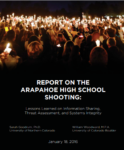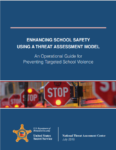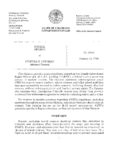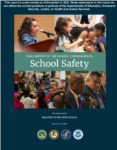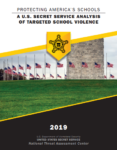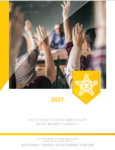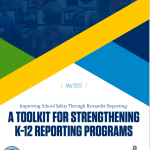What We Do

Safe2Tell empowers young people to keep their community safe.
We take reports any time, any day of the year from students or other community members who are concerned about their safety or the safety of others.
To Make an Anonymous Report
Download the Safe2Tell App
How it works
Safe2Tell provides students, parents, and community members a safe and anonymous way to report information about any issues that concern their safety or the safety of others. Safe2Tell’s reporting process is simple. Call to interact with a live, trained analyst or fill out a form on our website or mobile app.
The Safe2Tell Act (C.R.S. Section 24-31-601 et seq.) requires Safe2Tell to promptly forward information to local law enforcement, public safety agencies, or school officials. Information is not required to be forwarded if the call was transferred to Colorado Crisis Services (C.R.S. Section 27-60-103). Safe2Tell is obligated to ensure the identity of the person making the report is unknown to all parties including Safe2Tell employees with the rare exceptions listed in Senate Bill 21-081.
Safe2Tell is housed within the Colorado Department of Law. The program partners with the Colorado Information Analysis Center (CIAC) in the Colorado Department of Public Safety to answer and disseminate reports. Analysts engage reporting parties in a two-way dialog to maximize the information available for follow-up. They directly connect or refer to the appropriate mental health partners as needed. Safe2Tell analysts review every report and promptly forward it to local multidisciplinary teams. Multidisciplinary teams are comprised of local school and law enforcement personnel. Safe2Tell encourages a prompt response from multidisciplinary teams to all reports in the same fashion as if they received the information in person. Safe2Tell analysts allow 30 minutes for public safety answering points to acknowledge a report receipt and one business day for school personnel to view. Analysts call multidisciplinary teams immediately if they deem the report urgent. Safe2Tell gives multidisciplinary teams thirty days to provide response or outcome information and mark a report as closed. Once addressed, we require the intervening parties to complete a disposition documenting action taken and any relevant outcomes.
Overview of Safe2Tell
Safe2Tell was founded on the idea that early intervention is the key to preventing violence and saving lives. The program promotes early intervention by serving as a relay of information between people submitting reports and local multidisciplinary teams, such as schools and law enforcement agencies. The founding principles are:
- Educate the community on the importance of reporting safety concerns
- Encourage everyone to play a role in prevention
- Equip community stakeholders with a direct way to report anonymously
- Empower those who have the intention to help, prevent, or protect to make a difference


What’s the research behind Safe2Tell?
Safe2Tell is a national model for anonymous state-run school safety reporting lines. We were founded on the premise that students need an additional resource to break the code of silence and report when sharing with a trusted adult is too challenging. We have served as a model and provided assistance in other states and districts setting up their own reporting/tip lines. Below are a few publications that mention Safe2Tell as a best practice. Click on the images to view the reports.
Safe2Tell partners
The Colorado Information Analysis Center (CIAC) serves as the state’s fusion center, a multidisciplinary, multi-agency network of professionals from private sector, local, state, tribal and federal partners conducting analysis and sharing information to prevent, protect and respond to crimes and potential or actual acts of terrorism. CIAC, in the Colorado Department of Public Safety, Division of Homeland Security and Emergency Management, partners with the Colorado Department of Law to answer and disseminate reports. Safe2Tell analysts engage with the reporting parties in a two-way dialog to maximize the information available for follow-up. As appropriate, analysts directly connect or refer to the appropriate mental health partners as needed and distribute the information immediately to local responders.
The Safe Communities Safe Schools (SCSS) Model was established by the University of Colorado Boulder’s Center for the Study and Prevention of Violence, in partnership with the Colorado Attorney General’s Office, following the Columbine High School tragedy in 1999. The Model integrates key recommendations from the 2001 Columbine Review Commission’s Report, the U.S. Surgeon General’s Report on Youth Violence, and both prevention and implementation science. The SCSS Model offers schools and communities a strategic planning process to improve safety and create better learning environments by choosing prevention programs and practices and policies tailored to the specific needs of their school. The SCSS Model also builds the necessary infrastructure and supportive environment to implement these programs successfully.
The Center for the Study and Prevention of Violence (CSPV) is housed within the University of Colorado Boulder’s Institute of Behavioral Science. Founded in 1992 with funding from the Carnegie Corporation of New York, CSPV provides assistance to groups committed to understanding and preventing violence and other problem behaviors and promoting positive youth development.
988 is a national network of local contact centers offering free and confidential assistance to people feeling overwhelmed, panicked, or out of control, to experiencing suicidal thoughts or anything in between. Dial 988 and get connected with a trained specialist. When you text 988, you’ll be connected with a trained specialist. Texting is available in both English and Spanish. Live chat is available on the national 988 website in both English and Spanish. For more information, visit 988 Colorado Mental Health Line (Opens in new tab).
The Colorado Department of Education provides leadership, resources, support and accountability to the state’s districts, schools, teachers and administrators. CDE supports Safe2Tell in aligning it’s messaging to be aligned with diversity, equity and inclusion initiatives and helps assign a student to a school when the school is unknown by the tipster.
The Colorado Office of School Safety (opens in new window) fosters secure and positive learning environments for all Colorado students (pre-K through higher education) by providing essential tools and resources to schools and communities. This is achieved through its three units: Colorado School Safety Resource Center (opens in new window), Grants(opens in new window), and the Crisis Response Unit (opens in new window), along with many other valuable resources.


